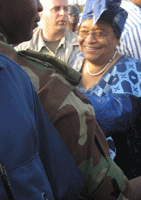
In Response To Allegations of Nepotism in the Sirleaf Government
By Abdoulaye W. Dukulé
Adukule@theperspective.org
The Perspective
Atlanta, Georgia
February 8, 2006
 |
The accusations should not be taken lightly. The Senator from Nimba, a former NPFL general, in conjunction with another former NPFL military leader, Senator Prince Y Johnson, has the capacity to block the nominations of people at strategic positions in the government. In the case of Alhaji Kromah, there is the underlying possibility of generating ethnic tensions in an already charged post-electoral atmosphere.
After winning his senate seat in October 2005, Mr. Adolphus Dolo campaigned tirelessly for Mrs. Sirleaf in Nimba in the run-offs elections, taking in two other former NPFL high-ranking members such as General Isaac Musa (Mensah) and many young former combatants. He therefore played a key role in swaying that county in favor of Mrs. Sirleaf. This alliance was based of two factors: the first was that Mrs. Sirleaf at some point in her campaign promised not to prioritize the setting up of a war crimes tribunal contrary to what was rumored in Nimba by the opposition. The second reason for most of Nimba fighters and former generals in joining the “Iron Lady” had to do with security. They feared a George Opong Weah government where people such as George Dweh and Charles Julu among others would be in charge of security. It must be pointed here that other non-combating citizens of Nimba sided with the Unity Party, including Cllr. Tiawan Gongloe, Harry Nyan, Dr. Joseph Korto and many others and their combined efforts ultimately led to UP sweeping the county. The campaign has come and passed and now is the time to distribute jobs.
One could speculate easily that in exchange for their supports for Mrs. Sirleaf, former NPFL generals expect some of their followers to be put in charge of the security apparatus, not only to gain jobs but also to guarantee their safety. When Mr. Dolo expressed “concerns about the appointments of these individuals who are members of the first family although there are other qualified Liberians who could equally serve at these posts,” he is certainly thinking about people who worked with him under Charles Taylor.
Three groups dominated the security apparatus in Liberia in the past 25 years: the Doe administration, when security personnel was mostly recruited from his ethnic group, especially after 1985; the Taylor NPFL with former combatants at the core of his security and finally ULIMO/LURD military organizations and they all relied heavily on ethnicity. In every variance, professionalism was rarely a criterion for appointment or promotion; loyalty to the “chief” was what made one a general or a chief of staff. On the sidelines, meanwhile, many Liberian security professionals pursued their careers and training away from the dangerous national political scene.
In the 1990s, Brownie Samukai, Fumba Sirleaf, Anthony Kessely, Madison Togba among others brought a great level of professionalism rarely seen in Liberia when they worked with either the military or the police. In so doing, they became a threat for the rebel armies and their patrons who wanted to control the nation and it is resources. Once they removed professionals from the security network through political maneuverings in the mid 1990s, the warlords and their followers were able to take hold of the country and its riches. Today, that old fear of educated professionals, coupled with the need to secure jobs is re-surfacing in the assertion of Senator Dolo.
It is not the relationships between the president and her nominees that should concern the Honorable Senator; he should rather focus his attention on the experience, the qualification and dedication of the candidates. Has Mr. Sirleaf graduated from West Point? Does he have a career path that makes him capable of running the national security of Liberia? Is he an honest person? Has he ever abused the basic human rights of other people? Can he be trusted to protect the country and its leaders from enemies both from within and outside? The same questions should be posed to about Mr. Brownie Samukai, who incidentally, is not a member of the first family and Mr. Momo Johnson.
The danger any political leader could face is what one may term “reverse-nepotism”, where one would bypass qualified and dedicated family members because of fear of being accused of nepotism. Fumba Sirleaf and Brownie Samukai are qualified Liberians who have proven their values in the most difficult of times. And it would be naïve to expect any president to put in charge of his or her security people s/he doesn’t know. With equal qualifications, a leader would rely on the person s/he knows best. Chairman Prince Y. Johnson and Co-chair Dolo, both of whom worked and lived in the military through their lives, should easily understand this. If the nominees knew nothing about the post they are called to occupy, one could legitimately raise issues.
Finally, regarding the assertions by Mr. Kromah that there are no Muslims in the government of Mrs. Sirleaf, our colleague Theodore Hodge provided the best possible response. We may just want to add that there were many Muslims around Mrs. Sirleaf during the elections, and some are still there. They helped the campaign and spent their time and money to ensure her victory. But they did not necessarily do so to be rewarded with a cabinet post. They joined her campaign because they saw in her the best possible leader for Liberia at this time of the nation’s history.
